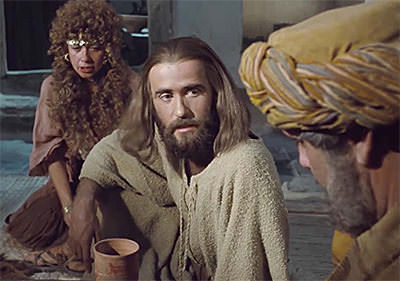More than a parable on “being thankful,” Luke wrote this parable as a love story that focuses on Jesus’ feet being anointed with tears and perfume by a sinful woman. It’s a love story, pure and simple, built on a love that’s very deep and truly heart-felt.
While dining with a Pharisee, Jesus presented to him his parable about two debtors whose obligation had been forgiven by their moneylender. As a result, Jesus asked the Pharisee which debtor loved his forgiving moneylender more.

“Your sins are forgiven.”
Note: Don’t confuse this parable with another about a woman anointing Jesus’ feet with expensive oil. See my intro that differentiates between the two.
Verse-by verse sequence

Click the list or the “bird” to enlarge and use Warren’s list of forty-four of Jesus’ parables (a PDF file with links to Scriptures).
Watch this popular JESUS Film clip from the Parable of Two Debtors that's titled "Sinful Woman Forgiven."
par•a•ble [noun] a simple story used to illustrate the meaning of or a moral or spiritual lesson, as told by Jesus in the gospels
synonyms: allegory, moral story/tale, fable
Jesus’ Parable of Two Debtors
Luke 7:36–50
Differentiating between Two “Anointing” Stories
Luke’s Parable of Two Debtors is similar to another story of Jesus being anointed by a woman. To understand today’s story of Jesus anointed by a sinful woman, we need to disentangle it from the story of Jesus’ anointing at Bethany, near the end of his ministry (Matthew 26:6–13; Mark 14:1–11; and John 12:1–10). Here are the similarities:
- Jesus is anointed with expensive perfume.
- He’s anointed by a woman.
- The anointing takes place in the house of a man named Simon.
The anointing at Bethany differs from this parable in that:
- It takes place at the home of Simon the Leper, not Simon the Pharisee.
- The woman doing the anointing at Bethany is not spoken of as sinful, but actually appears to be Mary, Lazarus’s sister.
- The meaning of the anointing at Bethany is to prefigure Jesus’ burial.
- The anointing is on Jesus’ head (Matthew and Mark) and possibly his feet (John).
- The criticism of the disciples, especially Judas, was over the value of the perfume that was “wasted,” rather than over the morals of the sinful woman doing the anointing.
Video compliments of Dallin Stephens
The Parable of Two Debtors and a Sinful Woman Who Anointed Jesus’ Feet
Dining at the Home of Simon the Pharisee, with a Sinful Woman (Luke 7:36–37)
Now one of the Pharisees invited Jesus to have dinner with him, so he went to the Pharisee’s house and reclined at the table. 37When a woman who had lived a sinful life in that town learned that Jesus was eating at the Pharisee’s house, she brought an alabaster jar of perfume, . . .
It was an honor for a Pharisee to host a visiting teacher, and Simon wanted to host dinner for this famous rabbi. Hospitality is a very strong value in the Near East, with much fuss made over guests. For example, a basin would typically be provided so guests could wash the dust of the road from their feet. Scented olive oil was sometimes offered to anoint a guest’s hair. And beloved guests would be kissed as they were greeted. We see that Simon offered none of these marks of a gracious host. Such overflowing hospitality wasn’t required; Simon wasn’t being discourteous. The way he welcomed his guests that day seems pro forma, but not especially warm or cordial.
We learn in v. 38 about a sinful woman who, surely but not surprisingly, hasn’t been invited. I learned that it was the custom then that, when a Rabbi dined in such a house, all kinds of people came in — they were quite free to do so — to listen to the pearls of wisdom that fell from his lips.
Though not so stated, many commentators presume that she was a prostitute. No matter, for her to come to the banquet at Simon the Pharisee’s house would have been difficult for her. She was viewed as a sinner, perhaps one who conveyed uncleanness by her very touch. She knew that Simon wouldn’t be happy to see her in his house but she entered nevertheless. The sinful woman had heard of Jesus; she probably knew of his teachings.
Jesus’ Feet, Anointed by Tears and Perfume (7:38)
. . . and as she stood behind him at his feet weeping, she began to wet his feet with her tears. Then she wiped them with her hair, kissed them and poured perfume on them.
As highlighted in the video above, the woman standing behind Jesus began to weep. Her tears fell upon Jesus’ feet and wet them. She unfastened her hair and let it fall freely. Kneeling down, she began to wipe and wash his feet with her hair. Next, she began to kiss his feet, perhaps as a common mark of deep reverence, especially to a leading rabbi. She continued kissing them.
Finally, out of her perfume vial, she poured scented oil onto his feet. Once the vial was opened, I’ll bet that almost immediately its smell was detected by everyone in Simon’s house. While Jesus had been the center of focus up till now, all eyes turned to the woman who was kneeling at Jesus’ feet, weeping, wiping, caressing his feet with her long black hair, kissing them with her lips, and pouring perfume upon both feet. Her intimacy probably appeared quite shocking to many of the guests, especially Simon the Pharisee.
Doubtful Judgment of the Pharisee (7:39)
When the Pharisee who had invited him saw this, he said to himself, “If this man were a prophet, he would know who is touching him and what kind of woman she is — that she is a sinner.”
Simon certainly acknowledged Jesus to be a qualified teacher (7:40b), but he doubted that Jesus was the prophet that some claimed. Simon judged the sinful woman and Jesus; he was wrong in both of his judgments. Interestingly, Simon didn’t condemn her touching action, per se, but condemned Jesus’ lack of discernment of who he’d allowed to touch him.
The Parable of Two Canceled Debts (7:40–43)
Jesus answered him, “Simon, I have something to tell you.”
“Tell me, teacher,” he said.
41“Two men owed money to a certain moneylender. One owed him five hundred denarii, and the other fifty. 42Neither of them had the money to pay him back, so he canceled the debts of both. Now which of them will love him more?”
43Simon replied, “I suppose the one who had the bigger debt canceled.”
“You have judged correctly,” Jesus said.
Jesus didn’t let Simon’s judgment go unchallenged. So he began to tell a story, a parable, to make a point. In this case, he emphasized the appreciation one would have felt being absolved of a moneylender’s crushing debt load, which could throw non-payers into debtor’s prison. Simon has stepped into Jesus’ trap.
Love, as Seen in Acts of Honor (7:44–47)
Then he turned toward the woman and said to Simon, “Do you see this woman? I came into your house. You did not give me any water for my feet, but she wet my feet with her tears and wiped them with her hair. 45You did not give me a kiss, but this woman, from the time I entered, has not stopped kissing my feet. 46You did not put oil on my head, but she has poured perfume on my feet. 47Therefore, I tell you, her many sins have been forgiven — for she loved much. But he who has been forgiven little loves little.”
Instead of judging the woman, as Simon had done, Jesus instead turned the judgment onto Simon, using a series of three comparisons. Jesus’ point wasn’t hard to miss. Simon’s actions had shown little love, while the sinful woman had lavished love upon Jesus.
Building upon his brief parable, Jesus turned from objectifying love to forgiveness (v. 47). To help Simon and the others understand her actions, Jesus first told a story about forgiveness. He then used the story to interpret the woman’s devotion, in terms of forgiveness of sins.
Your Sins Are Forgiven (7:48–50)
Then Jesus said to her, “Your sins are forgiven.”
49The other guests began to say among themselves, “Who is this who even forgives sins?”
50Jesus said to the woman, “Your faith has saved you; go in peace.”
Jesus didn’t linger on Simon’s shortcomings. He then turned to speak directly to the sinful woman and forgave her of her sins. The guests, however, didn’t understand, asking themselves, “Who is this who even forgives sins?” Simon’s guests are surprised to hear Jesus taking on the divine prerogative to forgive sin. He says that it is her faith that brought forgiveness — not her tears, kisses, or ointment. His last comment to her was “Go in peace” (v. 50). She received Christ’s command to enjoy that peace while living in the full realization of the peace that passes all understanding. She understood! Jesus acknowledged that her faith in his promise had brought her forgiveness and salvation.
We’re all “debtors” in the sight of our just Creditor. We've all sinned and continue to sin; none of us has a way to discharge our debt on our own. Thankfully, Christ can forgive all who truly repent of their sins and faithfully turn to him. Through his willingness to accept our debt and blot it out with his blood, we ought to humbly and thankfully receive the remission of our sins. Once freed from sin’s oppressive debt, we’re to show our gratitude to him by living in holiness and loving service to others, glorifying him in a life of righteousness.
A Hearty Application
The woman in this Bible story had lived a sinful life and felt a great deal of shame. Yet, she longed for God’s forgiveness. Jesus showed her his great compassion and mercy (as the video clip highlights well), despite her past mistakes.
Q. What’s the significance of the question, “Which of them will love him more?” Simon admitted that the one forgiven more would feel the most obligated and should love more. Jesus succeeded in causing Simon, by his own admission, to pronounce judgment on himself for misconstruing the woman’s act, doubting Christ Himself, and dishonoring his guest. All three people knew that the woman was sinful, but Jesus’ declaration that her sins were forgiven — in contrast to Simon’s condemnation — conveyed his great love of her who, in turn, responded appropriately by expressing lavish love upon Jesus. Add to that the fact that Christ was also willing to forgive Simon as he’d forgiven the repentant woman. However, while both debtors in the parable were forgiven, Luke gives no indication that Simon admitted his failings and agreed to repent.
Now for our application questions:
Q. Were the woman’s sins forgiven before she arrived at Simon’s house? Or were they forgiven when Jesus made his pronouncement?
Q. How would you have felt watching the woman anoint Jesus? Embarrassed? Confused? Uncomfortable? Appreciative?
Q. What have you found to be the hardest thing about dealing with sin and failure?
Oh, what a wonderful dinner party that must have been. What a love story to behold! Thank you, Jesus.
“Therefore, I tell you, her many sins have been forgiven — for she loved much.
But he who has been forgiven little loves little” (Luke 7:47).



